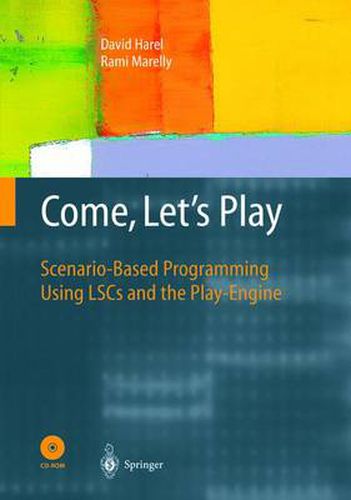Readings Newsletter
Become a Readings Member to make your shopping experience even easier.
Sign in or sign up for free!
You’re not far away from qualifying for FREE standard shipping within Australia
You’ve qualified for FREE standard shipping within Australia
The cart is loading…






This title is printed to order. This book may have been self-published. If so, we cannot guarantee the quality of the content. In the main most books will have gone through the editing process however some may not. We therefore suggest that you be aware of this before ordering this book. If in doubt check either the author or publisher’s details as we are unable to accept any returns unless they are faulty. Please contact us if you have any questions.
This book presents a powerful new language and methodology for programming complex reactive systems in a scenario-based manner. The language is live sequence charts (LSCs), a multimodal extension of sequence charts and UML’s sequence diagrams, used in the past mainly for requirements. The methodology is play-in/play-out, an unusually convenient means for specifying inter-object scenario-based behavior directly from a GUI or an object model diagram, with the surprising ability to execute that behavior, or those requirements, directly. The language and methodology are supported by a fully implemented tool - the Play-Engine - which is attached to the book in CD form. Comments from experts in the field:The design of reactive systems is one of the most challenging problems in computer science. This books starts with a critical insight to explain the difficulty of this problem: there is a fundamental gap between the scenario-based way in which people think about such systems and the state-based way in which these systems are implemented. The book then offers a radical proposal to bridge this gap by means of playing scenarios. Systems can be specified by playing in scenarios and implemented by means of a Play-Engine that plays out scenarios. This idea is carried out and developed, lucidly, formally and playfully, to its fullest. The result is a compelling proposal, accompanied by a prototype software engine, for reactive systems design, which is bound to cause a splash in the software-engineering community. Moshe Y. Vardi, Rice University, Houston, Texas, USAScenarios are a primary exchange tool in explaining system behavior to others, but their limited expressive power never made them able to fully describe systems, thus limiting their use. The language of Live Sequence Charts (LSCs) presented in this beautifully written book achieves this goal, and the attached Play-Engine software makes these LSCs really come alive. This is undoubtedly a key breakthrough that will start long-awaited and exciting new directions in systems specification, synthesis, and analysis. Gerard Berry, Esterel Technologies and INRIA, Sophia-Antipolis, FranceThe approach of David Harel and Rami Marelly is a fascinating way of combining prototyping techniques with techniques for identifying behavior and user interfaces. Manfred Broy, Technical University of Munich, Germany
$9.00 standard shipping within Australia
FREE standard shipping within Australia for orders over $100.00
Express & International shipping calculated at checkout
This title is printed to order. This book may have been self-published. If so, we cannot guarantee the quality of the content. In the main most books will have gone through the editing process however some may not. We therefore suggest that you be aware of this before ordering this book. If in doubt check either the author or publisher’s details as we are unable to accept any returns unless they are faulty. Please contact us if you have any questions.
This book presents a powerful new language and methodology for programming complex reactive systems in a scenario-based manner. The language is live sequence charts (LSCs), a multimodal extension of sequence charts and UML’s sequence diagrams, used in the past mainly for requirements. The methodology is play-in/play-out, an unusually convenient means for specifying inter-object scenario-based behavior directly from a GUI or an object model diagram, with the surprising ability to execute that behavior, or those requirements, directly. The language and methodology are supported by a fully implemented tool - the Play-Engine - which is attached to the book in CD form. Comments from experts in the field:The design of reactive systems is one of the most challenging problems in computer science. This books starts with a critical insight to explain the difficulty of this problem: there is a fundamental gap between the scenario-based way in which people think about such systems and the state-based way in which these systems are implemented. The book then offers a radical proposal to bridge this gap by means of playing scenarios. Systems can be specified by playing in scenarios and implemented by means of a Play-Engine that plays out scenarios. This idea is carried out and developed, lucidly, formally and playfully, to its fullest. The result is a compelling proposal, accompanied by a prototype software engine, for reactive systems design, which is bound to cause a splash in the software-engineering community. Moshe Y. Vardi, Rice University, Houston, Texas, USAScenarios are a primary exchange tool in explaining system behavior to others, but their limited expressive power never made them able to fully describe systems, thus limiting their use. The language of Live Sequence Charts (LSCs) presented in this beautifully written book achieves this goal, and the attached Play-Engine software makes these LSCs really come alive. This is undoubtedly a key breakthrough that will start long-awaited and exciting new directions in systems specification, synthesis, and analysis. Gerard Berry, Esterel Technologies and INRIA, Sophia-Antipolis, FranceThe approach of David Harel and Rami Marelly is a fascinating way of combining prototyping techniques with techniques for identifying behavior and user interfaces. Manfred Broy, Technical University of Munich, Germany